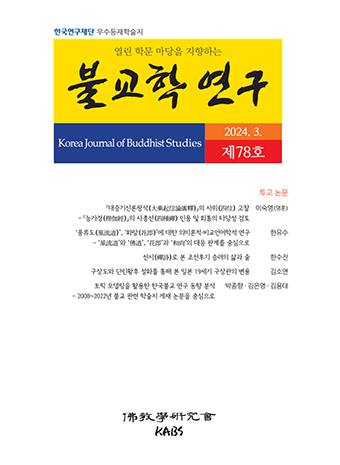Abstract
References
Sorry, not available.
Click the PDF button.
Information
Tang Yongtong (1893-1964) is a Buddhist scholar representative of modern China. With the publication of History of Buddhism in the Han, Wei, Jin and Northern and Southern Dynasties, Tang Yongtong made a history of the study of ancient Chinese Buddhism. He systematized the complete branches of philosophy during the Wei and Jin Dynasties, which include Metaphysics and Buddhism, in the scheme of the Theory of Substance and Function. The Theory of Substance and Function is basically a form of philosophy that posits substance as the basis of phenomena. Tang Yongtong included Seng Zhao’s philosophy of emptiness in that category as well. However, the objective of Seng Zhao’s idea of emptiness is to negate the notion of substance as the basis or essence of phenomena. This coincides with the first proposition of Madhyamaka Philosophy established by Nagarjuna. Tang Yongtong brewed a serious misconception of Seng Zhao by understanding him in the scheme of substance and function. Many subsequent scholars interpreted Seng Zhao’s philosophy as a form of substance-function theory by inheriting Tang’s idea, which contributed to the spreading of misconception. This paper clarifies that Seng Zhao’s Madhyamaka Philosophy is one that reveals the insubstantiality of phenomena rather than one that uncovers the basis or what lies behind the phenomena. By doing so, this paper aims to reveal that the Madhyamaka Philosophy of Seng Zhao’s is in conflict with the theory of substance and function and to confirm the misconception brewed by Tang Yongtong.
탕용통(1893-1964)은 근대 중국을 대표하는 불교학자이다. 그는 1938년 간행한 한위양진남북조불교사로 중국 고대 불교사 연구에서 한 획을 그었다. 탕용통은 위진현학과 위진불교를 포함하는 위진사상 전체를 체용론 도식으로 정리했다. 체용론은 기본적으로 현상의 근거로서 본체를 상정하는 철학 이론이다. 탕용통은 승조(僧肇)의 공사상까지 체용론 범주에 포함시킨다. 하지만 승조의 공사상은 바로 현상의 근거나 본질로서 본체를 부정하는 데 이론적 목적이 있다. 이는 용수에서 확립된 중관철학의 제1 명제라고 할 수 있다. 탕용통은 체용론 도식으로 승조 사상을 이해함으로써 승조에 대한 심각한 오해를 낳았다. 하지만 이후 많은 연구자가 탕용통의 학설을 계승하여 승조 철학을 체용론으로 이해함으로써 오해는 확산되었다. 본고에서는 승조의 공사상과 체용론이 서로 충돌함을 밝히고, 탕용통이 범한 오해를 밝히고자 한다.
Click the PDF button.
- Publisher :Korean Association of Buddhist Studies
- Publisher(Ko) :불교학연구회
- Journal Title :Korea Journal of Buddhist Studies
- Journal Title(Ko) :불교학연구
- Volume : 44
- No :0
- Pages :73~99


 Korea Journal of Buddhist Studies
Korea Journal of Buddhist Studies






